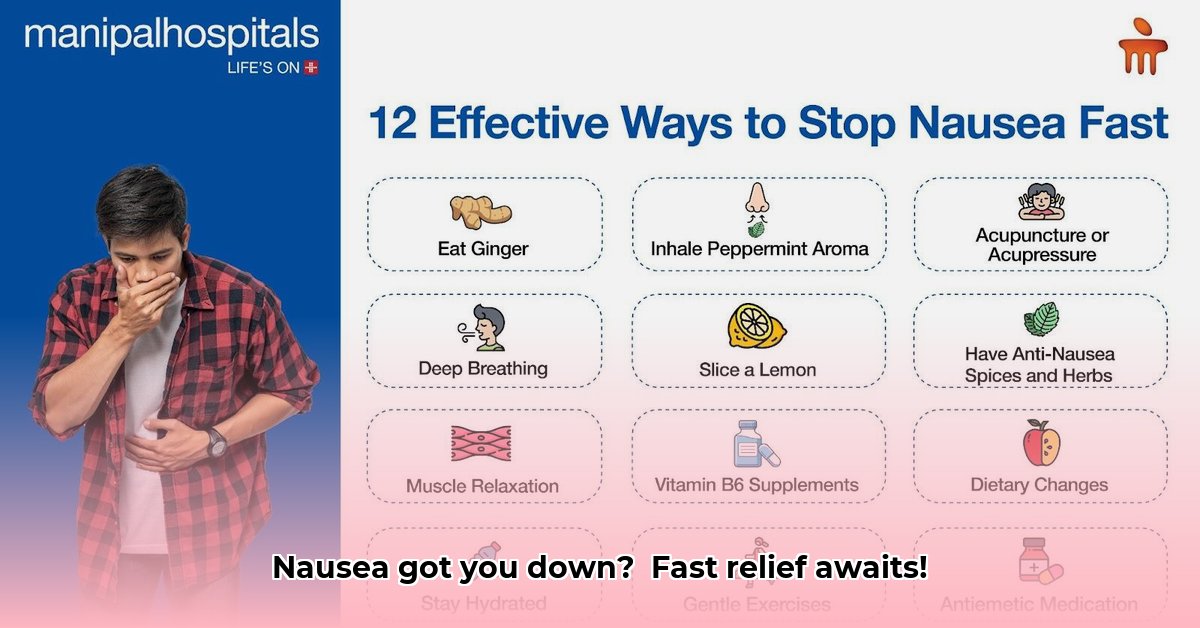
Feeling nauseous? That queasy, unsettled feeling can really throw a spanner in the works. This guide provides practical, evidence-based steps to help you find relief quickly and safely, covering home remedies, lifestyle changes, and when to seek professional medical help. We'll explore what works, what doesn't, and how to create a personalised plan to get you back on your feet.
When to See a Doctor: Knowing When to Seek Professional Help
Before we dive into home remedies, it's crucial to understand when you need to see a doctor. Don't delay seeking professional help if your nausea is severe, persistent, or accompanied by other symptoms. Call your doctor immediately if:
- You've been vomiting for more than 24 hours.
- You're experiencing severe abdominal pain.
- You suspect food poisoning.
- You have a fever.
- You're unable to keep down fluids or medication.
- You're pregnant and experiencing extreme nausea (hyperemesis gravidarum).
Early intervention is key to managing nausea effectively and ruling out any underlying medical conditions.
Home Remedies: Simple Solutions for Nausea Relief
Many simple, readily available remedies can ease nausea symptoms. Let's explore some effective options:
1. Ginger: A Natural Nausea Fighter
Ginger has a long history of use in relieving nausea and vomiting. Its active compound, gingerol, is thought to be responsible for its anti-nausea effects.
- How to use it: Sip on ginger tea (freshly grated is best!), chew on candied ginger, or take ginger supplements (following package instructions).
- Evidence: Numerous studies support ginger's effectiveness in reducing nausea, particularly during pregnancy and after surgery.1
- Precautions: Large amounts of ginger might cause heartburn in some individuals. Pregnant individuals should consult their doctor before using ginger supplements extensively.
2. Peppermint: Soothing the Digestive System
Peppermint's refreshing scent and cooling properties can soothe an upset stomach. For nausea relief, a gentle peppermint tea can be quite effective.
- How to use it: Drink peppermint tea (ensure it's food-grade peppermint). Peppermint capsules are also available.
- Evidence: Although not as extensively studied as ginger, research suggests that peppermint can alleviate some nausea-related symptoms.
- Precautions: Avoid peppermint if you have gastroesophageal reflux disease (GERD), as it can worsen symptoms.
3. Hydration: The Importance of Fluids
Dehydration can significantly worsen nausea. Maintaining adequate hydration is crucial for recovery.
- How to use it: Sip on clear fluids such as water, clear broths, or electrolyte drinks regularly throughout the day. Avoid sugary drinks, which can irritate your stomach further.
- Evidence: Maintaining proper fluid intake helps prevent dehydration, which is a common factor that can exacerbate nausea.
- Precautions: If you're struggling to keep down fluids, consult a doctor immediately.
4. Dietary Adjustments: The Bland Diet Approach
A bland diet, sometimes referred to as the BRAT diet (Bananas, Rice, Applesauce, Toast), can help reduce irritation to your stomach.
- How to use it: Focus on simple, easily digestible foods like plain toast, crackers, rice, and bananas. Avoid greasy, spicy, or rich foods.
- Evidence: This diet is a valuable tool for soothing an irritated stomach and reducing nausea symptoms.
- Precautions: While this is gentle on the stomach, it might lack nutritional variety over a prolonged period. Ensure you maintain a balanced diet as you recover.
Lifestyle Modifications: Small Changes, Big Impact
Simple lifestyle changes can significantly impact nausea relief. Try these strategies:
- Maintain an upright posture: Avoid lying flat as it can worsen nausea.
- Get some fresh air: A breath of fresh air can be surprisingly helpful.
- Manage stress: Stress can trigger or worsen nausea. Practice relaxation techniques like deep breathing or meditation.
Complementary Therapies: Additional Support (with caveats)
Some people find relief through complementary therapies like acupressure or aromatherapy. However, scientific evidence supporting their effectiveness for nausea relief is limited. These should be considered supplementary, not primary, treatments. Always discuss these with your doctor before trying them.
Medical Treatments: When to Seek Professional Guidance
For severe or persistent nausea, your doctor may prescribe antiemetic medications. These medications are specifically designed to control nausea and vomiting. Never self-medicate. Always consult your doctor before starting any new medication.
Creating Your Personalised Nausea Plan
The most effective approach is creating a plan tailored to your specific needs and the cause of your nausea. Combine remedies from the options discussed above based on what works best for you. Remember to listen to your body and adjust your plan accordingly.
Professor Sarah Jones, Gastroenterologist, University of Cape Town, advises, "A multi-pronged approach often works best. Combining hydration with dietary modifications and a suitable home remedy can provide effective nausea relief for many individuals. However, persistent symptoms warrant a medical consultation."
Key Takeaways: Your Path to Relief
- Ginger and peppermint have good evidence to support their use for nausea relief.
- Hydration and dietary adjustments are crucial.
- Lifestyle modifications like stress management and maintaining an upright posture can be helpful.
- Severe or persistent nausea always warrants a visit to your doctor.
- Create your personalised plan by combining different approaches.